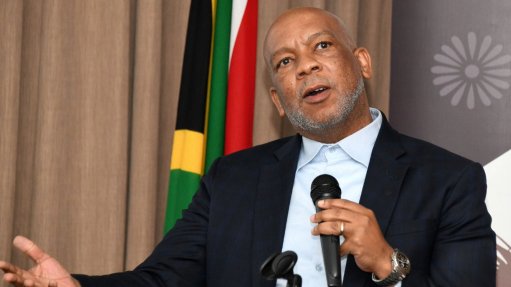Deloitte risk conference panel unpacks South Africa’s governance challenges
In light of widespread corruption, State capture and general organisational failures in South Africa, consultancy Deloitte this year themed its annual risk conference “The State of Governance and Ethical Leadership”.
The conference, held on Thursday, highlighted what was needed from corporate citizens to help reverse the “tide of destruction that has hit South Africa”, said Deloitte Africa risk managing partner Navin Sing.
JSE-listed gold miner Harmony Gold director Dr Simo Lushaba stated that the state of governance and ethical leadership was an important diagnosis that should be conducted more frequently and taken more seriously.
“It is unfortunate that we tend to talk about this topic of governance and it has gained popularity over the last decade, but as a result of corporate failures, accounting scandals, fraud, corruption and most recently State capture allegations has ruthlessly attacked particularly our procurement and recruitment processes in our organisations.”
He added that governance was about more than just a defensive system to address misdemeanors, since bad governance destroyed confidence in corporates, which affected future prosperity.
Lushaba stated that organisations were successful only if they create value for shareholders and that it was not good governance when leaders were simply not doing anything wrong.
“Not doing wrong is merely the beginning of leadership’s responsibility to create prosperity and value.
“Effective leadership does not define itself on how much wrong you do not engage in. Nothing short of corporates delivering value for every shareholder defines good governance.”
He said companies that have failed to enhance prosperity, had already experienced poor governance, and by the time it came to corruption and fraud, the poor governance was way beyond where it should be.
Lushaba believes corporates and civil society are not holding their line of expectations at the right level and are not holding people accountable until they are found guilty in court, and sometimes not even then.
He said the frame of reference for a leader’s trustworthiness did not lie in legislature, policies or even with judges and religious leaders, but in their own establishment and showcasing of trustworthiness – being purposefully ethical through their institutions, for example, with starting programmes that purposefully create value for others in an ethical manner.
Lushaba suggested that government and corporates needed to take due diligence in appointments more seriously.
“Today, some value the gift of the gab, noisemaking ability and popularity, while excellence has taken a back seat.
“We need to demand superior performance and global excellence. Organisations have to fortify a compelling environment where poor performance and unethical governance is not tolerated. We need to stop relying on policies that are only about stopping wrongdoing, and rather rely on policies that encourage people to do what is right.”
He added that individuals had too much power to appoint leaders without being held accountable.
MANAGING RISK
“We have been rudely awakened to the importance of risk management and subsequently to risk governance as critical elements of good governance,” said Lushaba.
International Monetary Fund South African representative Montfort Mlachila pointed out that poor governance led to greater incentives for corruption and opportunities for theft and said that was a risk to performance.
He highlighted that the key to managing risk was in always being aware of the risk and mitigating it well.
For example, the National Treasury has an e-tender system, which allows for the publication of tenders to the broader public sector – including State-owned enterprises and provincial government – to see information. This provides a centralised place to compare prices and bids, while increasing transparency and decreasing risk for the public and private sectors.
“This big data tool can help determine benchmarks and enables easier investigation into collusive behaviour,” explained Mlachila.
Institute of Directors South Africa chartered director Nandipa Madiba said it was necessary for board members to embed a culture of ethics and risk mitigation, and take risk management more seriously.
“While we more often consider operational risks, there is a risk for poor governance once the appointment process lacks credibility, or if an appointment creates blind loyalty towards an individual, even though they practice unethical behaviour,” she said.
Madiba advised that employees should remain attached to an ethical code, rather than an individual, stating that blind loyalty increased the risk of bad governance. She said a response towards risk could not be formulated, if that risk had not been identified.
Industry organisation Business Against Crime MD Tebele Makhetha said risks in corporate companies had to trigger innovative management strategies.
“The private sector should stop risky behaviour in their own companies as well, not just criticise government on its bad governance.”
She added that corporates needed to put safeguards in place for people that decide to speak up against unethical behaviour, while the criminal justice system needed to ensure criminal consequences, and not just financial slaps on the wrist.
South African Council of Churches general secretary Bishop Malusi Mpumlwana added that organisations needed to increase consequence management.
Mpumlwana noted that multinationals often wanted to limit or isolate the impact of their wrongdoing in their company to the specific country or even city that it happened in, which might downplay the issue and compromise effective consequence management as a result.
Comments
Announcements
What's On
Subscribe to improve your user experience...
Option 1 (equivalent of R125 a month):
Receive a weekly copy of Creamer Media's Engineering News & Mining Weekly magazine
(print copy for those in South Africa and e-magazine for those outside of South Africa)
Receive daily email newsletters
Access to full search results
Access archive of magazine back copies
Access to Projects in Progress
Access to ONE Research Report of your choice in PDF format
Option 2 (equivalent of R375 a month):
All benefits from Option 1
PLUS
Access to Creamer Media's Research Channel Africa for ALL Research Reports, in PDF format, on various industrial and mining sectors
including Electricity; Water; Energy Transition; Hydrogen; Roads, Rail and Ports; Coal; Gold; Platinum; Battery Metals; etc.
Already a subscriber?
Forgotten your password?
Receive weekly copy of Creamer Media's Engineering News & Mining Weekly magazine (print copy for those in South Africa and e-magazine for those outside of South Africa)
➕
Recieve daily email newsletters
➕
Access to full search results
➕
Access archive of magazine back copies
➕
Access to Projects in Progress
➕
Access to ONE Research Report of your choice in PDF format
RESEARCH CHANNEL AFRICA
R4500 (equivalent of R375 a month)
SUBSCRIBEAll benefits from Option 1
➕
Access to Creamer Media's Research Channel Africa for ALL Research Reports on various industrial and mining sectors, in PDF format, including on:
Electricity
➕
Water
➕
Energy Transition
➕
Hydrogen
➕
Roads, Rail and Ports
➕
Coal
➕
Gold
➕
Platinum
➕
Battery Metals
➕
etc.
Receive all benefits from Option 1 or Option 2 delivered to numerous people at your company
➕
Multiple User names and Passwords for simultaneous log-ins
➕
Intranet integration access to all in your organisation


















